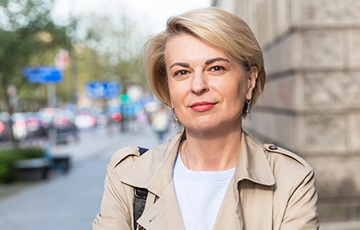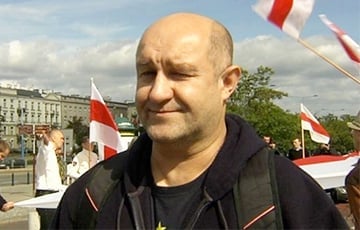We Are Certainly Not Brothers With Russians
59- Natallia Radzina
- 7.10.2024, 8:01
- 39,066

PHOTO: CHARTER97.ORG
The future of Belarus lies exclusively with the EU and NATO.
On October 4-5, the 13th Forum of Free Russia was held in Vilnius. Natallia Radzina, the editor-in-chief of Charter97.org, participated in the panel discussion entitled 'Endless Empire: Decolonisation With Or Without Quotation Marks'. She spoke about the European roots of the Belarusian people, the Russian occupation and outlined two potential scenarios for the liberation of Belarus:
'I would say it is not a matter of decolonisation, but rather one of de-occupation. After all, Belarus has been under the occupation of the Russian Empire for more than 200 years.
The Russian official historiography is brazenly and shamelessly lying. Therefore, the majority of Russians believe that since the end of the Ice Age Belarusians have only dreamed of being reunited with ‘Mother Russia’. For this reason, I will briefly remind you of some historical facts.
Belarus has a long historical tradition as a European country. The history of Belarusian statehood has its origins in the Polatsk principality, otherwise known as the state of the Kriviches on the 'Route from the Varangians to the Greeks'. During the 10th century, it was ruled by the first known prince, Rogvolod. Furthermore, Polatsk of the 5th century is referenced to in the Varangian chronicles, namely the renowned 'Deeds of the Danes'.
From the thirteenth century onwards, Belarus became part of the Grand Duchy of Lithuania, which was one of the largest state unions of the period. The formation of the Belarusian nation occurred within the Grand Duchy of Lithuania as a result of the intermingling of Slavic and Baltic tribes.
We are certainly not brothers. For a period of three centuries, from the mid-14th to the second half of the 17th century, there were 12 full-scale wars between the Moscow Principality and the Grand Duchy of Lithuania. It should be noted that these figure does not take into account the numerous instances of intermittent conflict and border disputes.
In the Soviet era, it was asserted that Belarus lost one-quarter of its population during the Second World War. However, few are aware that during the conflict between the Grand Duchy of Lithuania and Moscovia between 1654 and 1668, the country suffered a mortality rate of one-half of its population. Furthermore, over 80% of the eastern region's population perished, succumbing to disease or being enslaved in the East.
In the sixteenth century, in order to protect the eastern territories of the principality from the Moscow state, the Grand Duchy of Lithuania (GDL) and the Kingdom of Poland united to become the Polish-Lithuanian Commonwealth, also known as the Republic of Two Nations. It was a confederal formation, in which the Grand Duchy of Lithuania maintained all state institutions, including the army, legislation, self-government, courts, and monetary system, among others.
Towards the end of the 18th century, Russia forcibly annexed the Grand Duchy of Lithuania through the use of military force and financial incentives, a process known as the 'three partitions of the Polish-Lithuanian Commonwealth'. In accordance with the directives of the Russian tsars, we, Lithuanians, were renamed into Belarusians and turned from Uniates into Orthodox Christians.
Subsequently, over the course of more than two centuries, the Belarusian people were subjected to a series of attempts to eradicate their national identity. These occurred initially within the Russian Empire, then within the USSR, and finally during the 30-year pro-Russian dictatorship of Lukashenka.
Numerous uprisings, which were held by Belarusians together with Poles and Lithuanians in the captured territories, were suppressed. In 1918 the Bolsheviks suppressed the attempt of the Belarusians to create an independent state - the Belarusian People's Republic.
The destruction of our culture and language was accompanied by systematic persecution of the most prominent figures of the national intelligentsia, including writers, poets, artists, and musicians. The national elite, including the most capable managers, economists and politicians, were systematically eliminated. Hundreds of thousands of peasants were deported to Siberia and perished there. My ancestors, who were subjected to 'de-kulakised', i.e. robbed and then sent to Russia to die, were among them.
Indeed, in 1991, Belarus officially became an independent state. However, the rise to power of dictator Lukashenka in 1994 resulted in a significant halt to the process of establishing a genuinely independent nation-state.
Lukashenka was willing to pay for the advantageous pricing of oil and gas with his country's independence and Russification. There is not a single Belarusian-language university in the country, and the number of Belarusian-language schools has been significantly reduced. Furthermore, the number of hours dedicated to teaching subjects in the native language in schools is minimal. All state-run media, including television channels, are broadcast in the Russian language. The history taught in schools and universities is rewritten for the benefit of Russia. A significant number of historians and writers have been designated as extremists, incarcerated, or expelled.
Despite Belarus' political, military, and economic dependence on Russia, the mass protests in 2020 demonstrated the nation's resilience and vitality. A significant number of demonstrators, estimated at approximately one million individuals across the country, participated in the protests with historical national symbols, namely the white-red-white flag and the coat of arms of 'Pahonia'. The Belarusian people expressed their aspiration for autonomy and self-determination.
Indeed, Lukashenka was able to suppress the national uprising with the backing of the Kremlin. However, the most significant outcome was that the international community was able to witness first-hand that the Belarusian nation has its own distinct identity and that Belarus is not merely a regional entity within the Russian Federation.
And now I will tell you how I see the liberation of Belarus. I am sure that the current backward Russia will inevitably lose the war it is waging against Ukraine. Perhaps, this is its last thrust against the West. It seems inevitable that Russia will suffer defeat and, potentially, disintegrate in the future.
Such an outcome would present a historical opportunity for the Belarusian people.
Let us remember what was happening on the eve of 1991. The collapse of the socialist bloc took place simultaneously with the collapse of the USSR. Since 1989, there has been a massive fall of communist regimes in Eastern Europe: the Round Table and free elections in Poland, the fall of the Berlin Wall, the Velvet Revolution in Czechoslovakia, the liberation of Hungary and Bulgaria, the execution of dictator Ceausescu in Romania.
The same will happen in our country. I am sure that once the destructive processes in Russia intensify, changes will inevitably occur in Belarus.
I think it will happen following several scenarios:
- through mass popular protest;
- through a nomenklatura coup (possibly, together with mass protest).
We remember how quickly the Soviet nomenklatura in 1990-1991 reversed its position and turned itself into democrats. The same will happen this time. It is a matter of survival for the current Belarusian officials; today they do not want to become part of Russia. It is likely that tomorrow they will swiftly reposition themselves under the white-red-white flag.
The newly elected Belarusian government, which will include political prisoners released from prison, representatives of the exiled diaspora, and members of the nomenklatura, may face resistance on the part of the law enforcement agencies, which have turned into gangs under Lukashenka. It is they who have been committing crimes against humanity, of which the regime has been accused of in recent years.
In this case, the new coalition government of Belarus may invite to the country international peacekeeping forces under the aegis of NATO and the UN to ensure law and order and stability. It may be a force under the conventional name of BYFOR, following the example of KFOR - the international force under NATO leadership, responsible for ensuring stability in Kosovo. The KFOR force was created by a UN Security Council resolution.
The same peacekeeping force called BYFOR could be invited to Belarus.
Our further path is clear.
We should immediately withdraw from the 'union state', the CSTO, the EAEU, the CIS and declare our aspiration to join the European Union and NATO. Even neutral status is impossible in our case and will inevitably lead to the continuation of Russian influence and occupation. This mustn't be allowed in any case. It is therefore clear that Belarus' future lies exclusively with the EU and NATO.











